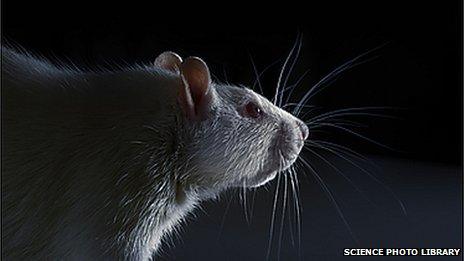Concerns over lab animal treatment at Imperial College
- Published

The panel of experts made 33 recommendations in total
Changes are needed to improve the treatment of laboratory animals at one of the UK's leading animal research centres, a panel of experts has said.
Their report follows allegations of animal suffering at Imperial College London, made in an undercover investigation by anti-vivisectionists.
The panel had been asked to conduct the inquiry by the college, which said it accepted the conclusions.
Campaigners described the findings as a "devastating indictment".
The report by the panel of independent scientists identified shortcomings in several areas.
It identified a lack of "adequate operational, leadership, management, training, supervisory and ethical review systems" at Imperial, where more than 1,000 people are involved in animal research on four separate sites.
The work carried out by the college's Animal Welfare and Ethical Review Body (Awerb), which has overall responsibility for ensuring the adequate welfare of animals used in experiments, was described as "not fit for purpose".
'Wholesale reform'
In April, the British Union for the Abolition of Vivisection (BUAV) released details of an undercover investigation which it said exposed cases of animals suffering at the college's labs.
The experts stressed that their remit was not to investigate the specific claims in the BUAV investigation, but the general systems employed at Imperial.
A key area of criticism was an "us and them" culture dividing animal care staff and scientists, who failed to communicate and work together efficiently.
The report praised the commitment of Central Biomedical Services staff at Imperial, who look after the day-to-day care of animals, and the quality of animal housekeeping.
But the college failed when it came to ensuring the highest standards in the "3Rs" - the replacement, reduction and refinement of animal testing, it said.
The panel made 33 separate recommendations for improvement, including "wholesale reform" of the ethics and welfare process, calling for the appointment of a new senior staff member to oversee local and central monitoring of the treatment of lab animals.
Review call
Prof Steve Brown, from the Medical Research Council's Mammalian Genetics Unit, who chaired the expert committee, said: "Our investigation identified a number of serious concerns on the conduct, management and oversight of animal research at Imperial College. The college now has the opportunity to take our findings and recommendations forward.
"Imperial College is internationally recognised as one of the world's best research institutes and it is important that this is matched by its standards of animal use and welfare."
The BUAV said the report's conclusions were a "devastating indictment" against the college and the system that allowed it to happen.
Head of policy Nick Palmer said: "We call on the Home Office to launch an immediate review of all the systems at all the other licensed sites to see where else suffering is being afflicted because if this happens at one of the world's leading universities what is happening elsewhere.
"It should not take an undercover investigation to expose what is happening in UK laboratories. The system overseeing animal experiments is broken and needs a drastic review."
Imperial College said it accepted the findings of the report and would "move quickly" to implement the recommendations. It said staffing and leadership were both being prioritised, and an annual report on animal research would be published.
Sian Harding, professor of Cardiac Pharmacology said: "We wanted to raise our standards above just answering allegations and to meet the highest international standards. We are a world-class institution and we should have world-class standards - and be leading in them."
- Published16 July 2013
- Published17 May 2012
- Published14 March 2012